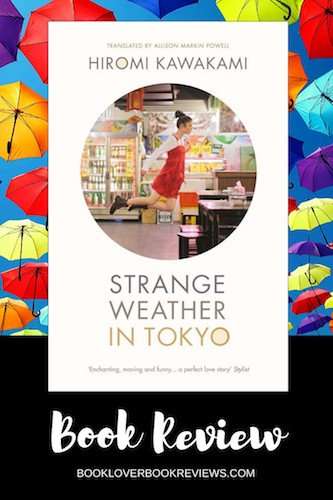Strange Weather in Tokyo, Review: Kawakami’s quiet charm
Strange Weather in Tokyo by Hiromi Kawakami (Sensei no kaban, aka The Briefcase) is a quietly affecting novel that readers are stealthily drawn into. It won the Tanizaki prize in 2001, was shortlisted for the Man Asian Literary Prize in 2013, and has been translated into thirteen languages. Read on for my full review.
Strange Weather in Tokyo Book Synopsis

Tsukiko is in her late 30s and living alone when one night she happens to meet one of her former high school teachers, ‘Sensei’, in a bar. He is at least thirty years her senior, retired and, she presumes, a widower. After this initial encounter, the pair continue to meet occasionally to share food and drink sake, and as the seasons pass – from spring cherry blossom to autumnal mushrooms – Tsukiko and Sensei come to develop a hesitant intimacy which tilts awkwardly and poignantly into love.
Perfectly constructed, funny, and moving, Hiromi Kawakami’s Strange Weather in Tokyo is a tale of modern Japan and old-fashioned romance.
Translated by Allison Markin Powell
Genre: Drama, Literature, Translations, Romance
Disclosure: If you click a link in this post we may earn a small commission to help offset our running costs.
Sign up to our Booklover Book Reviews emails and receive our gift for new subscribers. LEARN MORE >>
BOOK REVIEW
I do not read a lot of Japanese literature, but whenever I make time for it I find the experience cathartic. It may have something to do with the intrinsic cultural paradigms being quite distinct from the western norms that underpin much of the fiction I read. When reading Japanese literature I give greater thought to the meaning conveyed through symbolism. I have an enhanced desire to understand the motivations of characters.
Quiet charm and affection
Hiromi Kawakami’s Strange Weather in Tokyo is a quietly affecting little novel. The spats between the unlikely pair are quite charming. Sensei appears world-weary and calm, Tsukiko frustrated and impatient yet wary of life and prone to self-sabotage.
Kawakami draws readers into the tale slowly. I was enthralled to the extent that before I realised it was after midnight but I just had to keep reading.

This novel evokes a sense of detachment; of being shrouded in almost an out of body dreamlike state. Kawakami mines the sadness of isolation in a crowded space. The story framework Kawakami employs, a series of vignettes that allows the audience to dip into narrator Tsukiko’s life over time, reinforces that sense of detachment.
Use of symbolism
The reference to weather in the title (UK edition) and more specifically the way the narrative makes mention of the seasons’ impact on their daily lives as they come and go is symbolic of the inevitability of time passing. The title of the US edition of this translation is actually The Briefcase. Although a very different reference, it is also symbolic of a safety blanket and Sensei’s character trait of being prepared.
Although it contains greater humour than most Japanese fiction, Kawakami’s Strange Weather in Tokyo is by no means a flippant. It is a story that lingers long in the memory and poses food for thought for all.
PS: This novel is a treat for lovers of Japanese food too.
BOOK RATING: The Story 4.5 / 5 ; The Writing 4.5 / 5
Get your copy of Strange Weather in Tokyo from:
Amazon Bookshop Book Depository Kobo Booktopia
OR listen to the audiobook FREE with Audible’s Trial (check eligibility)
UPDATE: I have since read Hiromi’s Kawakami’s The Nakano Thrift Shop which I also very much enjoyed.
Related Reads:
Kitchen by Banana Yoshimoto / Good Luck Bag and Moving the Birds by Mitsuyo Kakuta / The Housekeeper and The Professor by Yoko Ogawa / Spring Garden by Tomoka Shibasaki / The Thief by Fuminori Nakamura
I have reviewed this title as part of Tony’s January in Japan initiative.
About the Author, Hiromi Kawakami
Born in 1958 in Tokyo, Hiromi Kawakami is one of Japan’s most popular contemporary novelists. She is the recipient of the Pascal Short Story Prize for New Writers and the Akutagawa Prize. Her novel Drowning won both the Ito Sei Literature Award and Joryu Bungaku Sho (Women Writers’ Prize) in 2000. Her novel Manazuru won the 2011 Japan-U.S. Friendship Commission Prize. Strange Weather in Tokyo (Sensei no kaban) won the Tanizaki prize in 2001, was shortlisted for the Man Asian Literary Prize in 2013, and has been translated into thirteen languages.
About the Translator, Allison Markin Powell
Allison Markin Powell is a literary translator and editor in New York City. She has translated works by Osamu Dazai, Kaho Nakayama, and Motoyuki Shibata, and she was the guest editor for the first Japan issue of Words Without Borders.
Other Reviews of Strange Weather in Tokyo
“The Briefcase is an excellent book, well-drawn out and thoroughly believable. There are a few moments of kitch, and a little melodrama towards the close of the novel, but Kawakami rescues it nicely with the ending.” — Tony’s Reading List
“Allison Markin Powell’s translation is clear and graceful. In its love of the physical, sensual details of living, its emotional directness, and above all in the passion for food, this is somewhat reminiscent of Banana Yoshimoto’s Kitchen. — The Independent
“Strange Weather in Tokyo is an extraordinary novella about the value of, and deep human need for, companionship. It is gentle, wise and written in such an hypnotic style it casts a spell upon the reader as it draws you into the dark world of Tokyo bars and the unlikely friendships it produces.” — Reading Matters
